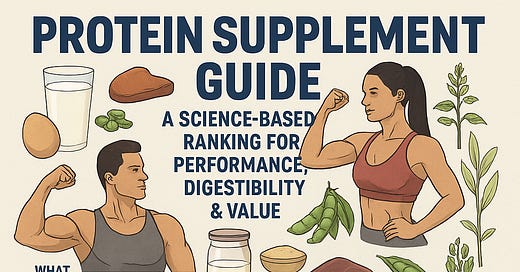🧬 Protein Supplement Guide: A Science-Based Ranking for Performance, Digestibility & Value
What “High-Quality Protein” Actually Means
Not everyone is like me, I’ll gulp down clumps of sand-like protein that taste like crap and cause painful gas if it’s the most bioavailable protein. But most people won’t, they will gladly sacrifice a little bio-availability for taste, texture, and easy digestion. So, I did a little research the past few days and here’s what I’ve come up with.
The term high-quality protein can refer to various factors:
Bioavailability – How effectively your body digests, absorbs, and utilizes the amino acids.
Digestive Comfort – The likelihood of causing bloating, gas, or gastrointestinal issues.
Price per 30g Protein – Cost-effectiveness based on a typical serving size.
Taste & Sweetener Palatability – Especially important for those sensitive to artificial aftertastes.
Additives & Purity – Whether the product is a clean, single-ingredient source or contains fillers.
NOTE: Only products with a calorie-to-protein ratio of 10:1 or better are included.
✅ Evaluation Method
Each product is scored 1 to 10 per category (1 = best, 10 = worst).
😋 Sweetener Palatability Scale (For Users Who Don’t Like the Taste of Artificial Sweeteners)
Allulose (hard to distinguish from real sugar)
Erythritol
Monk Fruit (Luo Han Guo)
Stevia
Sucralose
Aspartame
Saccharin
Acesulfame Potassium (Ace-K)
Neotame
Advantame
⚖️ Protein Type Rankings
🥇 1. Whey Protein Isolate / Hydrolyzed
Product: Dymatize ISO100 (✅ Informed-Choice Certified)
Bioavailability: 1
Digestive Comfort: 2 (hydrolyzed – low lactose)
Price per 30g: $1.38
Taste: 5 (sucralose + stevia — slightly artificial for some)
Additives: 4
Excellent absorption, well-tolerated, used medically and athletically.
🥈 2. Egg White Protein
Product: NOW Sports Egg White (✅ NSF Certified for Sport)
Bioavailability: 2
Digestive Comfort: 1 (universally tolerated unless allergic)
Price per 30g: $1.89
Taste: 2 (unsweetened, neutral — slight foam)
Additives: 1
Clean, complete amino acid source without dairy.
🥉 3. Micellar Casein
Product: Ascent Native Fuel (✅ Informed-Sport Certified)
Bioavailability: 3
Digestive Comfort: 5 (slow digesting; may feel heavy)
Price per 30g: $1.70
Taste: 1 (monk fruit + stevia — best natural taste profile)
Additives: 3
Slow-release nighttime recovery protein with excellent flavor.
4. Milk Protein Blend
Product: Muscle Milk Genuine (✅ NSF Certified for Sport)
Bioavailability: 4
Digestive Comfort: 8 (contains lactose, gums, oils)
Price per 30g: $1.50
Taste: 7 (sucralose + Ace-K — bitter aftertaste)
Additives: 8
Heavily processed; more meal replacement than clean protein.
5. Hydrolyzed Beef Protein
Product: MuscleMeds Carnivor (✅ Informed-Choice Certified)
Bioavailability: 5
Digestive Comfort: 4 (well tolerated; fortified amino acids)
Price per 30g: $1.65
Taste: 6 (sucralose only — artificial note)
Additives: 5
Non-dairy, fortified, and better than most expect.
6. Soy Protein Isolate
Product: NOW Sports Soy (✅ Informed-Sport Certified)
Bioavailability: 6
Digestive Comfort: 7 (gas in some; soy sensitivity possible)
Price per 30g: $1.10
Taste: 4 (unsweetened, earthy)
Additives: 1
Clean and affordable with good amino acid profile.
7. Pea Protein Isolate
Product: NOW Sports Pea (✅ Informed-Sport Certified)
Bioavailability: 7
Digestive Comfort: 5 (mild bloating possible)
Price per 30g: $1.05
Taste: 4 (unsweetened, grassy — blends well)
Additives: 1
Excellent value. Works best blended into shakes or smoothies.
8. Brown Rice Protein
Product: NOW Sports Sprouted Rice (✅ Informed-Sport Certified)
Bioavailability: 8
Digestive Comfort: 3 (very mild on the gut)
Price per 30g: $1.15
Taste: 8 (unsweetened, gritty)
Additives: 1
Best used with pea or egg protein to balance aminos.
🧪 Summary Rankings
Bioavailability
Whey
Egg
Casein
Milk
Beef
Soy
Pea
Rice
Digestive Comfort
Egg
Whey (Hydrolyzed)
Rice
Beef
Pea
Casein
Soy
Milk
Price per 30g
Pea – $1.05
Soy – $1.10
Rice – $1.15
Whey – $1.38
Milk – $1.50
Beef – $1.65
Casein – $1.70
Egg – $1.89
Protein Taste + Sweetener Palatability
Casein (monk fruit + stevia)
Egg (no sweetener — neutral, foamy)
Pea (no sweetener — grassy)
Soy (no sweetener — earthy)
Whey (sucralose + stevia)
Beef (sucralose only)
Milk (sucralose + Ace-K)
Rice (no sweetener — gritty texture)
🚩 Red Flags to Avoid
“Protein Blend” with No Breakdown
Often used to hide cheap filler proteins like gelatin, wheat, or soy concentrate. Without clear ratios, the actual protein quality is unknown.
What to look for instead: Named sources like “Whey Protein Isolate” or “Micellar Casein” listed as the first ingredient.
“Milk Derivatives” or “Milk Solids”
These are vague and may include lactose, sugar, fat, and minimal protein. They do not represent high-quality muscle-building protein.
What to look for instead: Products that list “Milk Protein Isolate” or “Milk Protein Concentrate” with full disclosure.
“Hydrolyzed Collagen” Marketed as Muscle Protein
Collagen lacks tryptophan, making it incomplete and ineffective for muscle protein synthesis. It has cosmetic and joint benefits, but not muscle repair value.
What to look for instead: Complete proteins with all essential amino acids — including tryptophan.
“Plant-Based” Without Source Details
Often used to conceal inferior proteins (like hemp or oat) with poor amino acid scores.
What to look for instead: Pea and rice isolates named clearly — or blends that explicitly list and balance their ingredients.
Sucralose + Ace-K
This artificial sweetener combo is known for a sharp, bitter aftertaste. It’s commonly found in cheaper or mass-market products.
What to look for instead: Monk fruit, stevia, or products that are unsweetened.
Not Certified for Sport
Without NSF Certified for Sport or Informed-Sport/Choice labeling, products may contain inaccurate protein amounts, undisclosed fillers, or even banned substances — especially risky for competitive athletes.
What to look for instead: Any of these 3 certifications:
✅ NSF Certified for Sport
✅ Informed-Sport
✅ Informed-Choice
🧾 Footnote: Micronized vs. Hydrolyzed
Hydrolyzed protein is enzymatically broken down into peptides for faster absorption and better digestion.
Micronized protein is simply ground into smaller particles for easier mixing — it does not improve absorption or reduce allergenicity.
✅ You’re Now Equipped to Choose the Best Protein for Your Goals
Whether you want fast recovery, better digestion, cleaner ingredients, or lower cost — you now have the science-backed info to choose the right protein, for the right reason.




